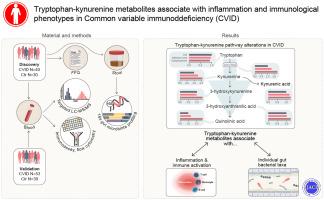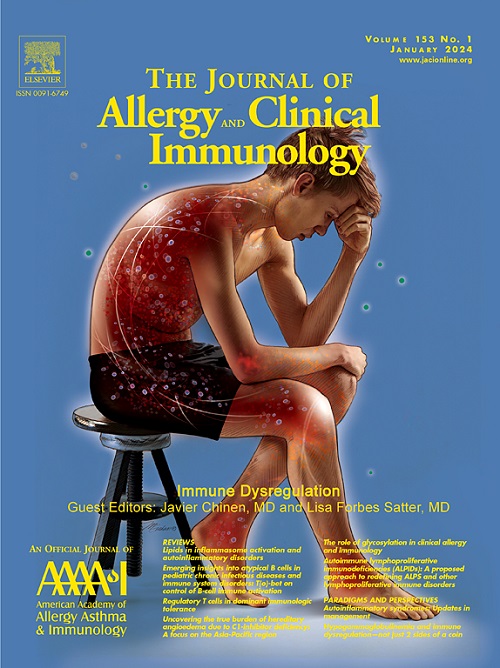Tryptophan–kynurenine metabolites associate with inflammation and immunologic phenotypes in common variable immunodeficiency
IF 11.2
1区 医学
Q1 ALLERGY
引用次数: 0
Abstract
Background
A large proportion of patients with common variable immunodeficiency (CVID) have autoimmune and inflammatory manifestations characterized by chronic T-cell– and monocyte/macrophage activation of unknown etiology. The tryptophan–kynurenine pathway has previously been linked to immune activation involving T cells and monocytes/macrophages, as well as with gut microbial dysbiosis in some inflammatory diseases.
Objective
We aimed to characterize the tryptophan–kynurenine pathway in CVID and its potential association with clinical/immunologic phenotype and gut microbial dysbiosis.
Methods
Serum concentrations of a set of tryptophan–kynurenine pathway metabolites and neopterin were measured using liquid chromatography–tandem mass spectrometry in a discovery cohort (n = 40), a validation cohort (n = 53), and healthy controls (n = 60). B-cell phenotype was analyzed in both cohorts, whereas inflammatory markers (enzyme immunoassay), lipopolysaccharide, gut microbial composition, and food frequency questionnaire were measured in the discovery cohort.
Results
Compared to healthy controls, CVID patients had increased metabolism of the tryptophan–kynurenine pathway as assessed by increased kynurenine/tryptophan ratio, quinolinic acid, and 3-hydroxykynurenine in both the discovery and validation cohorts. The findings were most pronounced in the subgroup with autoimmune/inflammatory complications but was to some degree also observed in CVID patients with infection only. In CVID, the metabolites in the tryptophan–kynurenine pathway associated with soluble (s) markers of monocyte (sCD14, sCD163, neopterin) and T-cell (sCD25) activation as well as B-cell phenotype (eg, naïve B cells). Individual gut microbial taxa may influence tryptophan–kynurenine pathway metabolites, but not lipopolysaccharide or diet.
Conclusion
We found altered levels of several metabolites in the tryptophan–kynurenine pathway in two different CVID cohorts associated with systemic inflammation and B-cell phenotype.

色氨酸-犬尿氨酸代谢物与常见可变免疫缺陷的炎症和免疫表型相关。
背景:很大一部分共同可变免疫缺陷(CVID)患者具有自身免疫和炎症表现,其特征是病因不明的慢性t细胞和单核细胞/巨噬细胞激活。色氨酸-犬尿氨酸途径先前与涉及T细胞和单核/巨噬细胞的免疫激活以及一些炎症性疾病中的肠道微生物生态失调有关。目的:研究CVID中色氨酸-犬尿氨酸通路及其与临床/免疫表型和肠道微生物生态失调的潜在关联。方法采用液相色谱-串联质谱法测定新发现队列(n = 40)、验证队列(n = 53)和健康对照组(n = 60)的一组色氨酸-犬尿氨酸途径代谢物和新蝶呤的血清浓度。在两个队列中分析了b细胞表型,而在发现队列中测量了炎症标志物(酶免疫测定)、脂多糖、肠道微生物组成和食物频率问卷。结果与健康对照相比,CVID患者的色氨酸-犬尿氨酸途径代谢增加,在发现组和验证组中均通过增加犬尿氨酸/色氨酸比率、喹啉酸和3-羟基犬尿氨酸来评估。这一发现在具有自身免疫/炎症并发症的亚组中最为明显,但在某种程度上也仅在感染的CVID患者中观察到。在CVID中,色氨酸-犬尿氨酸途径中的代谢物与单核细胞(sCD14, sCD163, neopterin)和t细胞(sCD25)活化以及B细胞表型(例如naïve B细胞)的可溶性标记物相关。个体肠道微生物类群可能影响色氨酸-犬尿氨酸途径代谢物,但不影响脂多糖或饮食。结论:在两个不同的CVID队列中,我们发现色氨酸-犬尿氨酸途径中几种代谢物水平的改变与系统性炎症和b细胞表型相关。
本文章由计算机程序翻译,如有差异,请以英文原文为准。
求助全文
约1分钟内获得全文
求助全文
来源期刊
CiteScore
25.90
自引率
7.70%
发文量
1302
审稿时长
38 days
期刊介绍:
The Journal of Allergy and Clinical Immunology is a prestigious publication that features groundbreaking research in the fields of Allergy, Asthma, and Immunology. This influential journal publishes high-impact research papers that explore various topics, including asthma, food allergy, allergic rhinitis, atopic dermatitis, primary immune deficiencies, occupational and environmental allergy, and other allergic and immunologic diseases. The articles not only report on clinical trials and mechanistic studies but also provide insights into novel therapies, underlying mechanisms, and important discoveries that contribute to our understanding of these diseases. By sharing this valuable information, the journal aims to enhance the diagnosis and management of patients in the future.

 求助内容:
求助内容: 应助结果提醒方式:
应助结果提醒方式:


